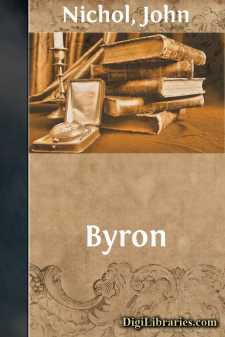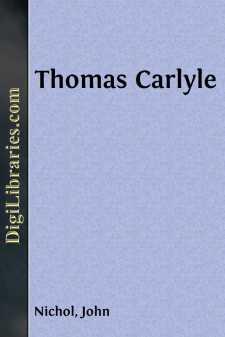Categories
- Antiques & Collectibles 13
- Architecture 36
- Art 48
- Bibles 22
- Biography & Autobiography 813
- Body, Mind & Spirit 142
- Business & Economics 28
- Children's Books 16
- Children's Fiction 13
- Computers 4
- Cooking 94
- Crafts & Hobbies 4
- Drama 346
- Education 46
- Family & Relationships 57
- Fiction 11829
- Games 19
- Gardening 17
- Health & Fitness 34
- History 1377
- House & Home 1
- Humor 147
- Juvenile Fiction 1873
- Juvenile Nonfiction 202
- Language Arts & Disciplines 88
- Law 16
- Literary Collections 686
- Literary Criticism 179
- Mathematics 13
- Medical 41
- Music 40
- Nature 179
- Non-Classifiable 1768
- Performing Arts 7
- Periodicals 1453
- Philosophy 64
- Photography 2
- Poetry 896
- Political Science 203
- Psychology 42
- Reference 154
- Religion 513
- Science 126
- Self-Help 84
- Social Science 81
- Sports & Recreation 34
- Study Aids 3
- Technology & Engineering 59
- Transportation 23
- Travel 463
- True Crime 29
Byron
by: John Nichol
Description:
Excerpt
CHAPTER I.
ANCESTRY AND FAMILY.
Byron's life was passed under the fierce light that beats upon an intellectual throne. He succeeded in making himselfвÐâwhat he wished to beвÐâthe most notorious personality in the world of letters of our century. Almost every one who came in contact with him has left on record various impressions of intimacy or interview. Those whom he excluded or patronized, maligned; those to whom he was genial, loved him. Mr. Southey, in all sincerity, regarded him as the principle of Evil incarnate; an American writer of tracts in the form of stories is of the same opinion: to the Countess Guiccioli he is an archangel. Mr. Carlyle considers him to have been a mere "sulky dandy." Goethe ranks him as the first English poet after Shakespeare, and is followed by the leading critics of France, Italy, and Spain. All concur in the admission that Byron was as proud of his race as of his verse, and that in unexampled measure the good and evil of his nature were inherited and inborn. His genealogy is, therefore, a matter of no idle antiquarianism.
There are legends of old Norse Buruns migrating from their home in Scandinavia, and settling, one branch in Normandy, another in Livonia. To the latter belonged a distant Marshal de Burun, famous for the almost absolute power he wielded in the then infant realm of Russia. Two members of the family came over with the Conqueror, and settled in England. Of Erneis de Burun, who had lands in York and Lincoln, we hear little more. Ralph, the poet's ancestor, is mentioned in Doomsday BookвÐâour first authentic recordвÐâas having estates in Nottinghamshire and Derby. His son Hugh was lord of Horestan Castle in the latter county, and with his son of the same name, under King Stephen, presented the church of Ossington to the monks of Lenton. Tim latter Hugh joined their order; but the race was continued by his son Sir Roger, who gave lands to the monastery of Swinstead. This brings us to the reign of Henry II. (1155-1189), when Robert de Byron adopted the spelling of his name afterwards retained, and by his marriage with Cecilia, heir of Sir Richard Clayton, added to the family possessions an estate; in Lancashire, where, till the time of Henry VIII., they fixed their seat. The poet, relying on old wood-carvings at Newstead, claims for some of his ancestors a part in the crusades, and mentions a name not apparently belonging to that ageвÐâ
Near Ascalon's towers, John of Horestan slumbersвÐâ
a romance, like many of his, possibly founded on fact, but incapable of verification.
Two grandsons of Sir Robert have a more substantial fame, having served with distinction in the wars of Edward I. The elder of these was governor of the city of York. Some members of his family fought at Cressy, and one of his sons, Sir John, was knighted by Edward III. at the siege of Calais. Descending through the other, Sir Richard, we come to another Sir John, knighted by Richmond, afterwards Henry VII., on his landing at Milford. He fought, with his kin, on the field of Bosworth, and dying without issue, left the estates to his brother, Sir Nicholas, knighted in 1502, at the marriage of Prince Arthur....



